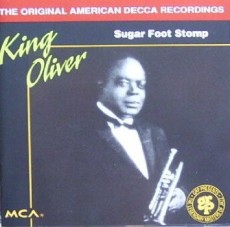
Daily Dose Of Jazz…
King Oliver was born Joseph Nathan Oliver on May 11, 1885 in Aben, Louisiana. He was also known as Joe Oliver and moved to New Orleans in his youth. He first studied the trombone and then changed to cornet. From 1908 to 1917 he played cornet in New Orleans brass and dance bands, and also in the city’s red-light district known as Storyville.
Oliver co-led a band with trombonist Kid Ory that was considered to be New Orleans’ hottest and best in the late 1910s. He gained great popularity in New Orleans across economic and racial lines, and was in demand for music jobs from rough working-class black dance halls to white society debutante parties.
With the closing of Storyville, Joe packed up his wife and child and moved to Chicago, Illinois in 1918. There he found work with clarinetist Lawrence Duhé, bassist Bill Johnson, trombonist Roy Palmer and drummer Paul Barbarin, eventually becoming the leader. By 1922 he was billing himself as King Oliver and his Creole Jazz Band at the Royal Gardens cabaret. His band included Louis Armstrong, Baby Dodds, Johnny Dodds, Lil Hardin, Honoré Dutrey and William Manuel Johnson. The following year they recorded for Gennett, Okeh, Paramount and Columbia record labels, bringing Dixieland to the attention of a much wider audience.
The mid-Twenties saw King enlarging his band to nine musicians, began performing more written arrangements with jazz solos, disbanding to do more freelance work in New York, Over the course of his career Oliver pioneered the use of mutes, including the rubber plumber’s plunger, derby hat, bottles and cups but his favorite mute was a small metal mute made by the C.G. Conn Instrument Company. He performed mostly on cornet, but like many cornet players he switched to trumpet in the late 1920s.
Oliver was also a talented composer, and wrote many tunes that are still regularly played, including Dippermouth Blues, Sweet Like This, Canal Street Blues, and Doctor Jazz. His recording Wa Wa Wa with the Dixie Syncopators can be credited with giving the name wah-wah to such techniques.
As an educator he influenced young New Orleans and Chicago players like Tommy Ladnier, Paul Mares, Muggsy Spanier, Johnny Wiggs Frank Guarente, Louis Panico and Louis Armstrong. The latter he taught, gave him his job in Kid Ory’s band and then summoned him to Chicago to play in his band.
As a businessman his acumen was often less than his musical ability losing jobs at the Savoy Ballroom and the Cotton Club by holding out for moe money than they were willing to pay. Ellington took the Cotton Club job and catapulted to fame
Oliver’s managers stole money from him and then the Great Depression hit losing his life savings to a failed Chicago bank, and bookings became lean.Oliver also had health problems, suffering from the gum disease pyorrhea, caused by his love of sugar sandwiches. He began employing younger musicians to play solos like up-and-coming trumpeter Henry “Red” Allen. Coupled with health problems suffering from periodontitis and his diminished capacity to play left him no choice but to stop playing by 1937.
Cornetist and bandleader King Oliver died in poverty of arteriosclerosis in a Savannah rooming house on April 10, 1938 at age 52, too broke to afford treatment. His sister spent her rent money to have his body brought to New York, where he was buried at Woodlawn Cemetery in the Bronx. In attendance were his friends Louis Armstrong, Clarence Williams, Coleman Hawkins, Lionel Hampton, W.C. Handy, Milt Jackson, and Max Roach. In 2007 he was inducted as a charter member of the Gennett Records Walk of Fame in Richmond, Indiana.
![]()
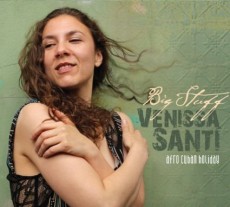
Daily Dose Of Jazz…
Venissa Santi was born on May 10, 1978 in Ithaca, New York. As a child she grew up listening to the sounds of Ravel, Celia Cruz and Michael Jackson as well as theatrical productions and jazz. But it was her grandfather, Cuban composer Jacobo Ros Capablanca, who instilled in her a connection to her roots through his compositions and a life-long passion for music. So after completing high school, she moved to Philadelphia, where she enrolled at the University of the Arts and majored in Jazz Vocal Performance.
After graduation, she became actively involved in Philadelphia’s Latin community and music scene and began her career as a vocal instructor with the Asociación de Músicos Latino Americanos, better known as AMLA. Over time she performed with a variety of Latin, jazz and World music groups. It was from the support and encouragement of this community that inspired Venissa to embark on the first of four life changing visits to Cuba, where she conducted research and studied Afro Cuban song, dance and percussion.
It was while under the tutelage of Master Gregorio “El Goyo” Hernandez and master dancers from Yoruba Andabo, Arturo Clave y Guaganco, Afro-Cuba de Matanzas and Irosso Oba, that she reconnected with her relatives in Cuba. Santi began to compose the soundtrack of her life’s journey thus far, resulting in an audacious new sound that defies borders, language and categorization.
In 2008 Venissa won the Pew Fellowship for Folk and Traditional Arts. 2009 saw her signed to Sunnyside Records, releasing Bienvenida, and has been praised by Ruben Blades and pianist Danilo Perez. Vocalist Venissa Santi has released her sophomore project Big Stuff and is currently performing at venues and festivals and preparing new material for her next project.
![]()
More Posts: vocal
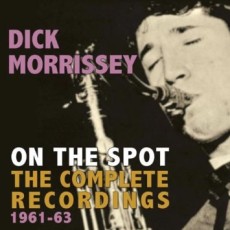
Daily Dose Of Jazz…
Richard Edwin Morrissey was born May 9, 1940 in Horley, England. Better known to the world as Dick Morrissey, he was self-taught and started playing clarinet in his school band, The Delta City Jazzmen, at the age of sixteen with fellow pupils Robin Mayhew, Eric Archer, Steve Pennells, Glyn Greenfield and young brother Chris on tea-chest bass. He then joined the Original Climax Jazz Band. This stint he followed with becoming a member of the Gus Galbraith Septet and was introduced to Charlie Parker by alto-sax player Peter King. This prompted him to begin specializing on tenor saxophone.
Making his name as a hard bop player, Dick appeared regularly at the Marquee Club in 1960 and recorded his first solo album for Fantana Records It’s Morrissey, Man! the next year at the age of 21. It featured pianist Stan Jones, drummer Colin Barnes, and The Jazz Couriers founding member bassist Malcolm Cecil.
Spending most of 1962 in Calcutta, India as part of the Ashley Kozak Quartet, he played three 2-hour sessions seven days a week. Returning to the UK Dick formed a quartet with Harry Smith, Phil Bates, Bill Eyden, Jackie Dougan or Phil Seamen. They recorded three albums between 1963 and 1966,played regular gigs at The Bull’s Head and Ronnie Scott’s, and played with Ian Hamer, South and
During this time he also played extensively in bands led by Ian Hamer and Harry South, The Six Sounds, performed briefly with Ted Heath’s Big Band, John Dankworth and his Orchestra, was a part of Eric Burdon and The Animals Big Band with Stan Robinson, Al Gay, Paul Carroll, Ian Carr, Kenny Wheeler and Greg Brown.
He would go on to tour and/or record with visiting musicians Brother Jack McDuff, Jimmy Witherspoon, J. J. Jackson, Sonny Stitt and Ernest Ranglin. He would win many Melody Maker Jazz Polls, toured and recorded with Average White Band, team up with guitarist Jim Mullen of Brian Auger’s Oblivion Express and released seven albums of their 16-year association.
Throughout his career as a leader of his own combos, Morrissey he was an in-demand musician playing with Tubby hayes, Bill LeSage, Roy Budd, Charlie Watts, Georgie Fame, Anie Ross, Dusty Springfield, Paul McCartney, Freddie Mack, Orange Juice, Herbie Mann, Shakatak, Peter Gabriel, David Fathead Newman, Boz Scaggs, Johnny Griffin, David Sanborn, Steve Gadd, Richard Tee, Billy Cobham, The Brecker Brothers, Sonny Fortune, Teddy Edwards and the list of players goes on and on. He is known for playing the haunting saxophone solo on the Vangelis composition Love Theme for the 1982 film Blade Runner.
Tenor saxophonist Dick Morrissey, who also played soprano saxophone and flute, passed away on November 8, 2000, aged 60, in Kent, England after many years battling various forms of cancer.
![]()
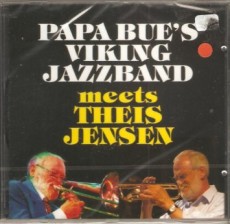
Daily Dose Of Jazz…
Papa Bue Jensen was born Arne Bue Jensen on May 8, 1930 in Copenhagen, Denmark, At an early age, he became fascinated with jazz, prompted by records from his brother with Harry James, Arte Shaw, Tommy Dorsey, Glenn Miller, Bert Ambrose, Bunk John and George Lewis in the stack.
After World War II, Jensen became a sailor for a few years, visiting ports all around the world, where he had an opportunity to listen to enjoy their music venues. It was around this time that he started to play jazz. He borrowed money to by a slide trombone, was taught the seven basic positions of the slide by a Royal Danish Orchestra musician, and the rest he taught himself. Soon he was playing with other young jazz musicians, performing in clubs and bars around Copenhagen.
He played in the Royal Jazzman band, that later became the Bohana Jazz Band, Henrik Johansen’s Jazz Band and recorded as a sideman with the Saint Peter Street Stompers in the 1950s. Papa Bue also worked with the Bonanza Jazz Band, Chris Barber, Adrian Bentzon and Johansen. During this period of his career he was immersed in the Nyhavn music scene jamming with other young jazz musicians. In 1956 he founded and led the New Orleans Jazz Band, and was given the nickname Papa Bue as he was the on father in the group.
In late 1957, after an article by Shel Silverstein was published in which he referred to them as the Danish Vikings, Jensen renamed the ensemble the Viking Jazz Band. They released their first album in 1958 and their sophomore project Schlafe Mein Prinzchen released in 1960, sold over one million copies, garnering them gold status.
Though bebop was in at the time he remained in the Dixieland style, but was influenced by early swing and is considered one of the most significant proponents of his genre. The group remained active into the 1990s, recording and/or performing with George Lewis, Champion Jack Dupree, Art Hodes, Wild Bill Davison, Wingy Manone, Edmond Hall, Albert Nicholas, Earl Hines, Stuff Smith and Ben Webster.
Papa Bue’s Viking Jazz Band recorded Bent Fabricius-Bjerre’s theme music for the Olsen Gang series, and was awarded the Golden Keys To The City in 1969 after performing at the 1969 New Orleans Jazz Festival. In 1989 he was awarded the Ben Webster Prize of Honor.
Trombonist Papa Bue Jensen, who released a large number of albums on Storyville, timeless and Music Mecca record labels though few are in print, passed away on November 2, 2011, at the age of 81.
![]()
More Posts: trombone
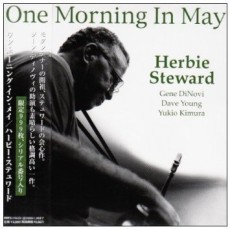
Daily Dose Of Jazz…
Herbie Steward was born Herbert Bickford Steward on May 7, 1926 in Los Angeles, California. He was widely known for being one of the tenor saxophones in the Four Brothers, alongside Stan Getz, Zoot Sims and Serge Chaloff in Woody Herman’s Second Herd.
Having a nice tone, Steward interacted well and was an above-average soloist. He also played alto saxophone, soprano saxophone and clarinet and was active from the 1940s to the Sixties and played in the swing and big band jazz genres. During his active years he recorded or performed with Earle Spencer, Smith Dobson, Tecumseh “Tee” Carson, Eddie Duran, John Mosher, Eddie Moore, Gene DiNovi, Sir Charles Thompson, David Young, Yukio Kimura, Kohnosuke Saijoh, Al Cohn, Stan Kenton, Chaloff and Sims.
Tenor saxophonist Herbie Steward, who has only a few albums as a leader in print at present, passed away on August 9, 2003 in Clearlake, California.
![]()
More Posts: saxophone


